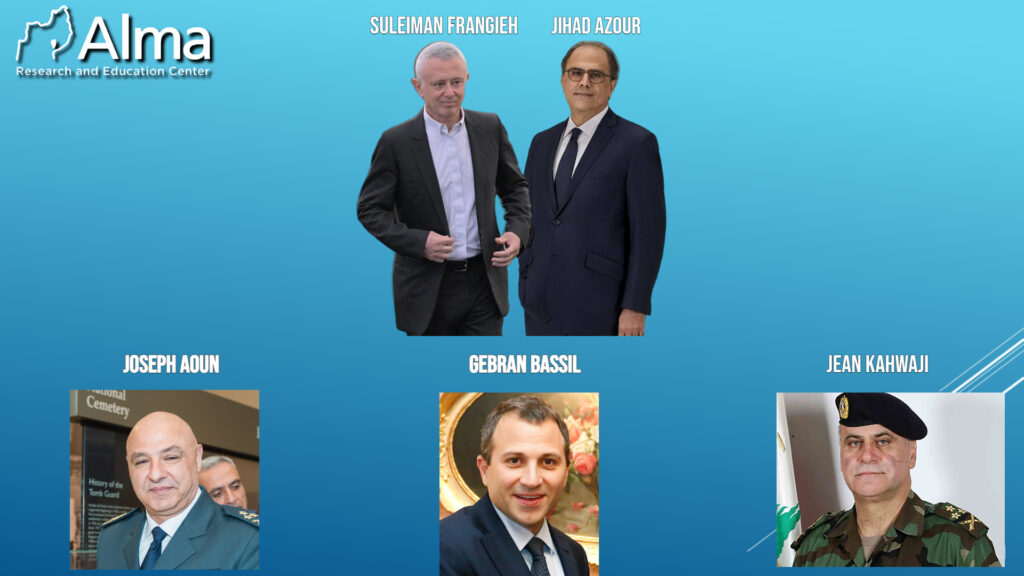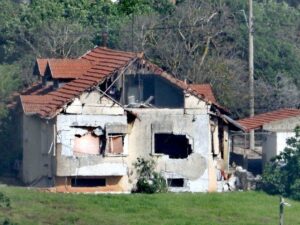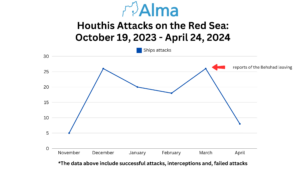Lebanon had elections on May 15, 2022. Following that, we published an article discussing the election outcomes and their significance. We addressed the approaching presidential elections, among other things, and wrote: “The office of President of Lebanon is an open issue.” Samir Geagea, Gebran Bassil, and Suleiman Frangieh are three contenders who believe they are qualified for the office of president. However, will the current commander of the LAF, Joseph Aoun, be elected, or will the former commander of the LAF, Jean Kahwaji, be resurrected to prevent the political system from collapsing?”
See the full article from May 2022.
What has transpired since? No one can be entrusted with the responsibility of establishing a government in Lebanon until a president is elected, so we are still in a transitional government. And What about Lebanon’s president? Stagnation. Hezbollah manipulates the Lebanese government as it deems fit. We will return to that later. Consequently, and as we noted in a recent article, the paralysis in the Lebanese political system and the failure to elect a president have a direct impact on Lebanon’s economic situation.
Former Lebanese President Michel Aoun concluded his term on October 31, 2022. The president, who must be a Maronite Christian according to the Lebanese constitution, is elected for a six-year term and is supposed to be elected by a two-thirds majority of the Lebanese parliament.
On June 14, 2023, the twelfth round of elections for the Lebanese presidency took place, but again no president was elected. There have been twelve rounds in which the legislature cannot reach a consensus, of the two-thirds majority that is required to elect one of the candidates. There are 128 MPs; one candidate must receive 86 votes in the first round to be elected. In the second round, a simple majority (65 votes) is required, but only if at least 86 members of parliament are present.
In Lebanon, two apparent prominent candidates emerged:
Suleiman Frangieh – Born in 1970, head of the Al-Marada faction (Tayyar al-Marda), which belongs to the March 8 faction. It should be noted that in the previous round of presidential elections, Hezbollah supported Mishael Aoun, while Suleiman Frangieh was supported by Saad Hariri. This is despite the fact that Frangieh supported the Assad regime and Hezbollah’s involvement in the civil war in Syria. In the current elections, he is supported by Hezbollah and the Amal Movement.
It should be noted that a Hezbollah ally, Gebran Bassil, Mishael Aoun’s successor as head of the Free Patriotic Movement (at-Tayyār al-Waṭanī al-Horr), opposes Frangieh’s appointment. This is despite the fact that Hezbollah recently offered him to support Frangieh as part of the compromise negotiations, thereby ensuring Hezbollah’s support for him in the next presidential elections.
Jihad Azour– Born in 1966, obtained his PhD with high honors in international finance from the Institut d’Etudes Politiques de Paris in France in 1996. While completing his Ph.D., he served as a postdoctoral fellow at Harvard University’s Department of Economics and served as Minister of Finance in the government of Fouad Siniora from 2005 to 2008. He was backed by the Lebanese opposition, including Samir Geagea, the leader of the Lebanese forces (al-Quwwāt al-Lubnānīyah), Sami Jamil, the leader of the Phalange party (Harakat al-Kataib al- Lubnānīyah), Walid Jumblatt, the leader of the Druze community, and Sunni representatives.
Hezbollah opposes Azor because he was a member of the Siniora government, which opposed its activities. On June 23, Sheikh Ahmed Qabalan, the Shi’ite Mufti of Lebanon, said that “Tel Aviv will not be allowed to influence the presidential candidate, and that the Lebanese president will not be allowed to wear an American ring…” In other words, as far as the Shiites are concerned, he is a representative of the United States and is even indirectly accused of supporting Israel.
Status
Suleiman Frangieh received 51 votes in the twelfth and final round, while Jihad Azour received 59 votes. However, Nabih Berri, the speaker of the parliament, canceled the vote in the second round before it even began, as members of the parliament, primarily from Hezbollah and Amal, left the parliament immediately following the conclusion of the first round, preventing the formation of a minimal legal forum for conducting the vote in the second round.
On July 12, 2023, Nasrallah expressed Hezbollah’s support for candidate Suleiman Frangieh and the need to conclude the issue of electing a president.
At the end of August 23, Maronite Patriarch Bechara Boutros al-Rahi said that agreements must be reached through dialogue and that the issue of the election of the president must be resolved.
In July and August 23, there were increasing reports that one of the options for resolving the issue of the election of the Lebanese president was Gebran Bassil’s agreement to support Frangieh’s candidacy following his dialogue with Hezbollah. Basil’s initiative concerns the passing of two laws: the expanded Administrative Decentralization Act in the House of Representatives and the passage of the Trust Fund Act.
Hezbollah, for its part, discussed these issues with Nabih Berri, the second part of the Shiite Duo, as well as with Frangieh. In August it was reported that Frangieh had held meetings with Wafiq Safa, Hezbollah’s liaison and coordination officer, on this issue.
Moreover, there is apparently another agreement, as noted above, that Hezbollah promised Bassil that in return for his support for Frangieh in this round, Bassil would be the next candidate for the presidency of Lebanon supported by Hezbollah.
It should be mentioned that France is participating and working to address the situation. In August, it was announced that Jean-Yves Le Drian, the French President’s envoy to Lebanon, will return to Beirut in September to try to further discussions to find a solution to the presidential issue.
In early September ’23, it was reported that Ammar al-Mousawi, Hezbollah’s head of Arab and international relations, met with the new French ambassador to Lebanon, and among other things discussed the election of the president to Lebanon and the economic situation.
At the beginning of September 23, Nabih Berri said that it was necessary to promote dialogue between the sides in parliament in order to reach the election of a president for Lebanon and that during September 23 he intended to press for a final election.
On 13/09/23, it was reported that the French envoy, Jean-Yves Le Drian, held a meeting on 12/09/23 with Frangieh pertaining the resolving the presidential issue. On September 13, 2023, Le Drian met with Mohammad Ra’ad, head of Kutlat Al-Wafa’ Lil-Muqawama, Hezbollah’s Loyalty to the Resistance Bloc for resistance in parliament, to discuss the issue of electing the president.
A report by the Al-Jadeed network from September 14, 2023, shows the extent to which the election of the next president in Lebanon depends only on Hezbollah. According to this report, Nasrallah met with candidate Frangieh several times recently. Frangieh asked Nasrallah to update him on the dialogue sessions in order to prepare himself for the next parliamentary session, for the sake of the national interest.
On September 15, 2023, it was reported that Nabih Berri, the speaker of the Lebanese parliament, had rejected French envoy Le Drian’s suggestion to choose a third presidential candidate. At the same time, it was claimed that Muhammad Ra’ad visited Frangieh again and reiterated his support for him.
And what will happen in the end:
As with everything in Lebanon, the choice ultimately rests with Hezbollah. Hezbollah wields both military and political influence. Once again, Hezbollah suggests using force on the one hand, or creating a stalemate on the other, as was the case in the previous election round in which Michel Aoun was elected president, or during the previous government’s attempts to establish itself.
Even the French envoy prefers to hold meetings with senior Hezbollah figures who hold the key to solving the presidential crisis over opposition representatives.
The dialogue depicted is the agreement of supporters motivated by personal interests: Basil and his desire for a position of power and influence, as well as his future presidential candidacy, versus Hezbollah’s desire to appoint a president who is one of its allies, rather than a president who may have a negative effect on Hezbollah’s power even when forming a new government.
In Lebanon, it is impossible and forbidden to ignore Hezbollah as a major political player. All the political actors, including Geagea, know that dialogue with Hezbollah is necessary and that it must act wisely, especially in the difficult economic situation in which the Lebanese country finds itself.
In conclusion, the new Lebanese president who is likely to be elected will be Frangieh. It can already be predicted that the future president after him (the promise to Bassil) will in fact be a marionette in the hands of Hezbollah.
Sources:
https://www.bbc.com/arabic/trending-65906587
https://www.bbc.com/arabic/middleeast-65843039
نبيه بري: أتمنى أن يكون أيلول شهر حسم انتخاب رئيس جمهورية لبنان (alquds.co.uk)
لبنان: بطريرك الموارنة يهاجم معطّلي انتخاب رئيس الجمهورية (aawsat.com)
باسيل: اتفاق أولي مع “حزب الله” على مسار اسم توافقي لرئاسة لبنان (alaraby.co.uk)
ماذا طلب سليمان فرنجية من السيد نصرالله في اللقاء الأخير؟ – Lebanon News (aljadeed.tv)
لودريان للخروج من ثنائية فرنجية – أزعور إلى مرشح ثالث للرئاسة اللبنانية (aawsat.com)






